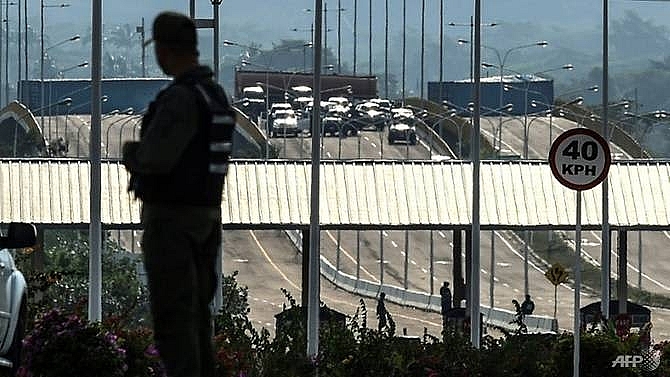Venezuelans send out SOS signal from Colombian border
 |
| A member of Venezuela's National Guard patrols at Tienditas international bridge in Urena, Venezuela. (Photo: AFP/Juan Barreto) |
"Right now it's a critical situation, it's terrible because we have nothing: no gloves, no dressings, no medicines," Francis Duran, a 34-year-old nurse at the San Antonio hospital in the border town of Urena, told AFP.
Duran was part of a motorcycle escort that accompanied a march to the Tienditas border bridge that separates Urena from the Colombian town of Cucuta, where tons of US aid is being stored ahead of an attempt to bring it into Venezuela.
"I'm a nurse and, for my patients, I demand that humanitarian aid enters," said the message on one sign attached to a motorcycle.
Venezuela is in the grip of an economic crisis with millions of people suffering from shortages of food and medicines
Urena is a crucial battleground in opposition leader Juan Guaido's power struggle with Maduro.
Guaido, who proclaimed himself acting president last month, has made access to aid a key challenge to the authority of the socialist leader, who refuses to allow it in.
Maduro says the aid is nothing more than a "political show" and a pretext to a US intervention.
Soldiers loyal to the president have blocked the Tienditas bridge with two freight containers and a tanker.
But Guaido, recognized as interim president by 50 countries, says the aid will come in on Feb 23. He says 250,000 volunteers have signed up to help bring it in and has issued a direct order to the armed forces not to obstruct it.
"WE WANT TO SAVE LIVES"
Duran says the aid is "necessary". She says an 11-year-old girl had to be transfered urgently to Cucuta a few days ago for a transfusion because there wasn't any available blood in Venezuela.
"We want to save lives," said Fanny Alvarez, a 20-year-old student nurse who said she was protesting to demand "solutions".
"There are no medicines, no gloves, no cotton, but yes there are bonuses for corruption," read a sign held by Alvarez's mother.
The first batch of US aid contains non-perishable food, hygiene products and emergency medicines, sufficient to meet the needs of 39,000 people for 10 to 90 days, the US embassy in Colombia said.
Duran has to send her patients to buy their own medicines in Colombia, but those can be unaffordable due to hyperinflation in Venezuela that has left the national currency practically worthless.
Venezuela is short of 85 per cent of the medicines it needs, according to human rights organisations that are highly critical the the government, which blames the problems on tough US economic sanctions, although those mostly target regime individuals.
Despite more than 10 years of experience, Duran earns only 18,000 bolivars (around US$6) a month but that is evaporated by inflation, which the International Monetary Fund expects to reach a staggering 10 million per cent this year.
Despite the shortages, the government distributed free medicines on Monday (Feb 11) near the Tienditas bridge: painkillers, antibiotics and anti-inflammatories.
"It would be a blessing from heaven if the aid came in," said Ana Sanchez, 72, who carried a cross and the Venezuelan flag during the march.
TENSIONS
At Villa del Rosario, a Colombian border town, queues of Venezuelans wait to cross over to buy food, take their children to school or just escape from their own country.
There, AFP reporters noticed a greater presence than normal of the National Guard, the branch of the armed forces responsible for internal security.
The tension was palpable amid security barriers and riot police.
"When I arrived with my son we had to run to get through because they were setting up yellow barriers so the riot police could take up positions," said Angie Diaz, 33.
Diaz comes every day from San Antonio to take her nine-year-old son Freddie to school. She says that in her town, "intimidating" messages are circulating on social media, warning people against protesting lest the "collectives fall on you".
The collectives are organisations loyal to the socialist regime and which the opposition accuses of acting like armed militias.
"There's a tense atmosphere with people who want to leave" the country, said Diaz.
Recently, 40,000 people a day have crossed the border bridge, a slight increase on the previous weeks, Colombia's migration agency said.
Most of those return home, though.
Andrea Barberi, a young Venezuelan who crosses the border every day to work in Cucuta, says he's noticed greater "tension" amongst the National Guard.
"Something's going to happen here," he said.
What the stars mean:
★ Poor ★ ★ Promising ★★★ Good ★★★★ Very good ★★★★★ Exceptional
Related Contents
Latest News
More News
- Russian President congratulates Vietnamese Party leader during phone talks (January 25, 2026 | 09:58)
- Worldwide congratulations underscore confidence in Vietnam’s 14th Party Congress (January 23, 2026 | 09:02)
- Political parties, organisations, int’l friends send congratulations to 14th National Party Congress (January 22, 2026 | 09:33)
- 14th National Party Congress: Japanese media highlight Vietnam’s growth targets (January 21, 2026 | 09:46)
- 14th National Party Congress: Driving force for Vietnam to continue renewal, innovation, breakthroughs (January 21, 2026 | 09:42)
- Vietnam remains spiritual support for progressive forces: Colombian party leader (January 21, 2026 | 08:00)
- Int'l media provides large coverage of 14th National Party Congress's first working day (January 20, 2026 | 09:09)
- Vietnamese firms win top honours at ASEAN Digital Awards (January 16, 2026 | 16:45)
- ASEAN Digital Ministers' Meeting opens in Hanoi (January 15, 2026 | 15:33)
- ASEAN economies move up the global chip value chain (December 09, 2025 | 13:32)

 Tag:
Tag:




















 Mobile Version
Mobile Version